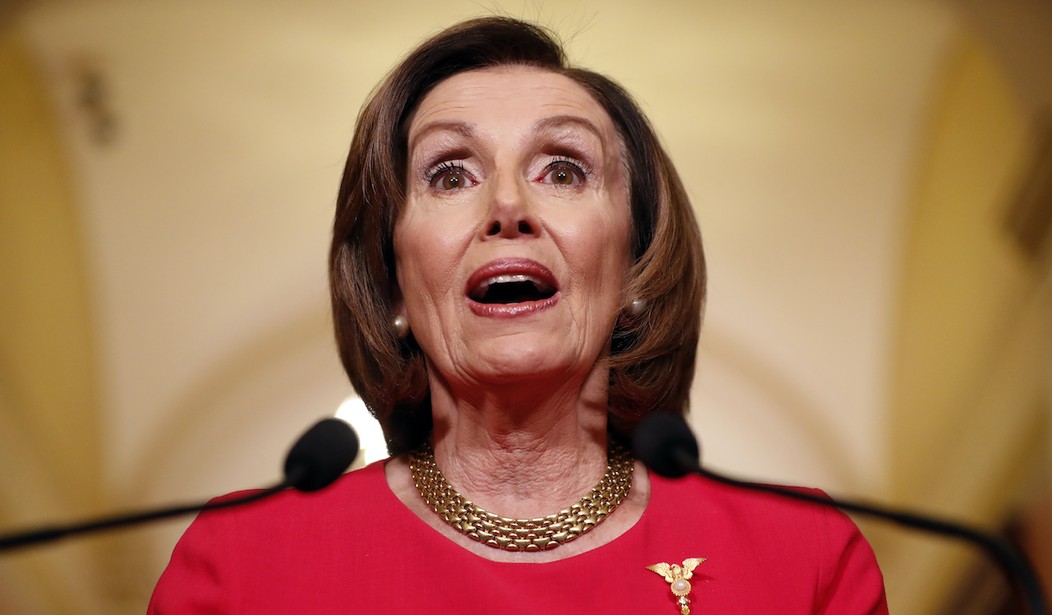House Speaker Nancy Pelosi has joined in an effort to curtail the religious liberty of Catholics.
Specifically, she has joined an amicus brief arguing that the Supreme Court nullify a regulation the Trump administration issued under the Affordable Care Act that would allow organizations that have religious objections to buying health insurance plans that cover sterilizations, contraceptives and abortifacients to buy health insurance plans that do not cover these things.
Pelosi has condemned this regulation as "despicable."
Last week, she put out a statement explaining her outrage.
"Speaker Nancy Pelosi issued this statement after joining a bicameral amicus brief in the United States Supreme Court in the cases of Trump v. Pennsylvania and Little Sisters of the Poor v. Pennsylvania arguing against the Trump Administration's expansive rule allowing private employers to opt-out of providing contraceptive coverage for their employees, in violation of the Affordable Care Act's contraceptive-coverage requirement," said the statement posted on her website.
As you can see, Pelosi is on the opposite side of this case from the Little Sisters of the Poor.
They are defending religious freedom and the right to life. She is attacking both.
"The Trump administration's despicable rule allowing private employers and health plans to deny women coverage for contraception is an outrageous attack on women's health, women's pocketbooks and women's independence," Pelosi says in her press release.
In fact, the language of the Affordable Care Act did not expressly mandate that insurance plans include "contraceptive" coverage. However, a regulation issued by the Obama administration for implementing the Affordable Care Act did require that health insurance plans cover without copay "all Food and Drug Administration approved contraceptive methods, sterilization procedures, and patient education and counseling for all women with reproductive capacity."
Recommended
FDA-approved contraceptive methods include drugs such as Plan B, which, according to the FDA, can prevent a new human being (after "fertilization") from implanting in the mother's womb.
Sterilization, artificial contraception and abortion are all against the moral teachings of the Catholic Church. Forcing Catholics to cooperate in them is forcing Catholics to act against their faith.
When the Affordable Care Act contraceptive mandate came before the Supreme Court in 2016, a group of 50 Catholic theologians and ethicists explained this to the court in an amicus brief.
"Regardless of the Government's definition of 'abortion,' the Catholic faith views the destruction of a human embryo at any time after conception -- including during 'the interval between conception and implantation of the embryo' -- as an abortion, and gravely wrongful," said these theologians and ethicists.
"The Catholic Church also deems contraception and elective sterilization to be seriously wrongful," they said.
They additionally argued that the "accommodation" the Obama administration had offered to those who had religious objections to the mandate did not remove the moral obstacle for Catholics.
Under this accommodation, an employer who had a religious objection to complying with the contraceptive mandate was required to fill out a form for the insurance provider or the government. This triggered a process that resulted in the insurance provider directly providing the mandated contraceptive coverage to those enrolled in the objector's plan.
"If Petitioners submit Form 700 or the HHS Notice as required by the 'accommodation,' there is a reasonable probability that they will trigger the provision of contraceptives and abortifacients to their employees that otherwise would not have happened," the theologians and ethicists said.
"Likewise," they said, "if Petitioners maintain a health plan or ongoing insurance relationship through which the Government undertakes to provide the objectionable coverage, it is reasonably foreseeable that their actions will contribute to the use of abortifacients, contraception, and sterilization that otherwise would not have happened."
"Thus," they concluded, "Petitioners can reasonably conclude that compliance with the Mandate threatens to make them the 'but-for' causes of grave moral wrongs, including the taking of innocent human life."
The Supreme Court in 2016 declined to issue a definitive opinion on the contraceptive mandate.
But in November 2018, the Trump administration issued two final rules providing exemptions to it. One exempted organizations that had religious objections to the coverage. The other exempted organizations that had moral objections. Both allowed the Obama administration's "accommodation" to remain in place for employers who wanted to voluntarily use it.
The state of Pennsylvania sued to stop the regulation protecting religious liberty. The Supreme Court will hear the case this month.
The brief that Nancy Pelosi signed along with 148 other House members and 37 senators argued that protecting religious liberty has to be balanced against "compelling government interests."
"Accepting Petitioners' arguments would require the Court to abandon the critical balance between burdens on religion and harm to others that it has maintained for decades and so recently reaffirmed," said the Pelosi-signed brief
"Moreover," it said, "Petitioners' arguments, if accepted, could alter this careful balance between accommodating religious freedom and protecting compelling governmental interests, not only with respect to contraceptive coverage but also in other areas."
"The accommodation of sincerely held religious beliefs cannot be permitted to upend the careful, necessary balance between respect for religious freedom and the government's interest in protecting public health and welfare and prohibiting discrimination against women," said the Pelosi-signed brief.
Pelosi's apparent position is that the government's interest in forcing Catholic employers to maintain insurance plans that the government insists must be conduits for coverage of sterilizations, contraceptives and abortifacients justifies curtailing the religious liberty of those employers.
Terence P. Jeffrey is the editor in chief of CNSNews.com.

























Join the conversation as a VIP Member